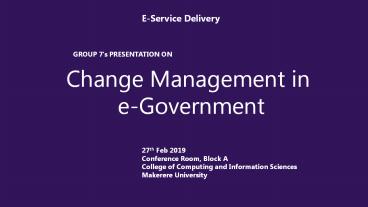Change Management in e- Government - PowerPoint PPT Presentation
Title:
Change Management in e- Government
Description:
Change Management in e- Government Kenneth Otto Shafiq Maureen – PowerPoint PPT presentation
Number of Views:42
Title: Change Management in e- Government
1
E-Service Delivery
GROUP 7s PRESENTATION ON
Change Management in e-Government
27th Feb 2019 Conference Room, Block A College of
Computing and Information Sciences Makerere
University
2
Group membership
Change Management in e-Government
Name Reg No Student No Email
Kenneth Kelvin Otto 2018/HD05/2132U 1800738426 Kenneth.Otto_at_nwsc.co.ug
Lutaaya Shafiq 2018/HD05/2094U 1800738426 lutayashafiqholmes_at_gmail.com
Maureen Ndagire 2018/HD05/2124U 1800738426 MaureenNdagire_at_gmail.com
3
Change Management in e-Government
- Objectives
- Introduction of Change Management
- Key elements in ensuring successful change
management during e-government implementation - Key barriers to change management
- Changes that ought to be managed in e-government
implementation - Categories of e-service digital interaction for
which change management is most essential
4
Electronic services as a result of Proper change
management in Estonia
i-Voting
e-Tax board
e-Notary
e-Business
e- Cabinet
e-Government
e-Prescription
e-Geoportal
e-Residency
e-School
e-Ticket
5
Change Management
- Change management is defined as a structured
approach to transitioning individuals, teams,
organizations from a current state to a desired
future state. (Hallencreutz Turner, 2011).
E-Government
The use of ICT combined with organizational
change and new skills in order to improve public
services, democratic processes and public
policies. E-government implementations reduce
costs and levels of organizational processes.
(Alshehri Drew, 2010).
6
Key elements in ensuring successful change
management during e-government implementation
- Processes
- People
- Technology
- Organizational Culture
- Structure
7
Key elements in ensuring successful change
management during e-government implementation
8
Key barriers to change management in e-Government
- Organizational culture
- Poor realization of ICT potential
- Poor change management strategy
- Resistance to change by the employees
- Lack of Project Management
- Distribution of e-Govt services over different IT
systems in different organizations - Inadequate business process reengineering
- Under communicating the vision
- Under estimating the power of the vision
- Failure to create a sense of urgency
- Failure to create a powerful guiding coalition
- Allowing obstacles to block the new vision
- Failing to create short term wins
- Declaring victory too soon
- Neglecting to anchor changes firmly in the
culture
9
Key barriers to change management in e-Government
- Leadership failures
- Financial inhibitors
- Digital divides and choices
- Poor coordination
- Workplace and organizational inflexibility
- Lack of trust
- Poor technical design
10
Changes that ought to be managed in e-government
implementation
- Communication
- Swift Change
- Training
- Change Reinforcement
11
Steps required for successful change management
John P. Kotter
12
1. Creating a climate of change
13
2. Creating an engaging enabling organization
14
3. Implementing sustaining the change
15
Categories of e-service digital interaction for
which change management is most essential
- Dynamic, secure interaction or transaction
- Secure contraction
- Complete transaction process
- Support functions
16
Categories of digital interaction
Categories of digital interaction Providers purpose Content and structure Effect on the receiver
Information provision or simple, static communication Provide general information or services on individual user Requests Static, structured information, or exchange of messages, or feedback solutions No specific effect other than to get access to standard documents or to communicate with specific actors
Dynamic, secure interaction or transaction Initiate a well-defined data handling process, e.g. complete an e-form Dynamic, involves various types of data and processes A change of state for the user, e.g. to update information in a database.
Secure contraction Carry out a specific task regulated by law, as part of public service provision Formalized exchange of structured information according to regulation. Establish a contractual relation between parties, e.g. accept and sign a debt Certificate.
Complete transaction Process Initiate and execute a complete set of tasks (e.g. complete case handling) Formalized sequence of interactions processes, according to regulation. Lawful (legally based) decisions that affect the user
Support functions, e.g. Login/Single Sign On, etc. Execute a process that is required for executing a task Formalized exchange of data according to specific protocols/rules, regulated by law. mandatory functions when interacting with public agencies.
17
The End
Thank you































